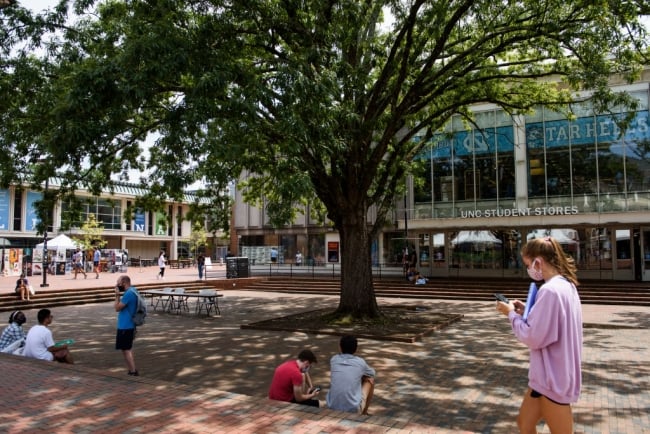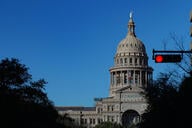You have /5 articles left.
Sign up for a free account or log in.

The University of North Carolina at Chapel Hill’s School of Civic Life and Leadership is moving forward.
Nearly 700 University of North Carolina at Chapel Hill faculty members signed a letter last month criticizing, among other things, the university’s proposed School of Civic Life and Leadership.
Regardless, administrators recently announced that the school is moving forward. Leaders say they have budgeted millions of dollars, and an associated program recently hired a new faculty member.
The controversy over the school began—or perhaps simply returned—in January.
That’s when Chapel Hill’s Board of Trustees abruptly passed a resolution asking the flagship campus’s administration to “accelerate its development of a School of Civic Life and Leadership,” with “a goal of a minimum of 20 dedicated faculty members and degree opportunities for undergraduate students.”
Then, David Boliek, the board’s chairman, went on Fox and Friends, saying the initiative was “an effort to try to remedy” what he called a lack of “right-of-center views” on campus. It sounded like the university was trying to resuscitate a proposal, dating at least back to 2017, for a center for conservative thought.
The ensuing controversy played out in the media and university meetings. Faculty members objected, while Chapel Hill administrators described the proposal differently than Boliek had.
A conservative center, or an unbiased effort to promote civil discourse and democracy? Whatever the School of Civic Life and Leadership does become, administrators have said it is coming.
“I’m pleased to announce that we are making significant progress,” Kevin M. Guskiewicz, chancellor of the Chapel Hill campus, told the board May 18.
Guskiewicz said the Program for Public Discourse, currently a small program that will be part of the new school, has hired a new faculty member: Rory Hanlon, a teaching fellow in the humanities at the University of Chicago.
“He looks incredible,” Guskiewicz said. “And if we can hire 15 more like Rory, I think we’re going to be in great shape.”
A university spokeswoman said Friday that Hanlon, who will also be part of the philosophy department, is the first new faculty member hired for the Program for Public Discourse since the broader School of Civic Life and Leadership was proposed.
Guskiewicz told board members the school will bring together people of “diverse backgrounds, experiences and viewpoints to debate the issues of our time.” He said an interim director is planned to be appointed in the fall, and courses may be taught as early as spring 2024.
Jim White, dean of the College of Arts and Sciences, provided an update to the university last week.
“The School of Civic Life and Leadership was publicly proposed by the Board of Trustees at its January meeting,” he wrote. “Since then, $2 million in continuing funds to support the school, to be housed in the college, were specified in the university’s budget for next fiscal year. In addition, the proposed budgets of both the North Carolina Senate and House of Representatives include an additional $2 million each for two years to launch the school. The final budget has yet to pass, so we will wait to see if those funds materialize.”
He also noted faculty members had been appointed to two new related committees.
One committee, filled with department chairs and senior associate deans, is charged with, among other things, proposing how to form “administrative structures” and “a faculty for the ‘School.’” The other committee, staffed with lower-level faculty members, is charged with proposing how to review new courses for a related oral communication program.
The university spokeswoman provided White’s statement and Guskiewicz’s comments to Inside Higher Ed Friday and said in an email that “We do not have any additional information at this time to provide.” She said White and the provost, Chris Clemens, weren’t available for interviews.
Meanwhile, Perrin W. Jones, who was elected to the board in 2021, has written op-eds this month saying, among other things, that the board “did not introduce the idea for the school—the university’s faculty and administration did, over several years. Afterward, our trustees endorsed the idea and urged its acceleration.”
In another op-ed, titled “The True Story of UNC-Chapel Hill’s New School,” Jones wrote that “Twice, in September and October of 2019, the Faculty Council discussed PPD [the Program for Public Discourse] and rejected proposals to halt it, thereby allowing the program’s development to continue. The initiative was always envisioned ultimately as including curricular components for interested students.”
But, in the next sentence, he seemingly concedes, “More recently, top university administrators redefined the program’s long-anticipated expansion as a proposed school, for which they planned to seek state funding” (emphasis added). Jones didn’t return requests for comment.
Clemens, in September 2019 remarks to the Faculty Council, when he was acting director of the Program for Public Discourse but not yet provost, said, “This program does not seek to change or alter the approved IDEAs in Action curriculum structure in any way. It also does not call for any new degree, any new certificate, any new curriculum, any new major or any new minor. What it does is it seeks to support faculty for any course that explicitly incorporates structured advocacy, argumentation or debate.”
“There was not to be a new school, a new major or a new department,” Lloyd Kramer, chair of the faculty at the time, told Inside Higher Ed.
“I think this is what startled the faculty now is it evolved beyond what people were expecting,” Kramer said.
Mimi Chapman, current chair of the faculty, said, “I’m very curious as to why it’s so important for these entities to claim things about the faculty that aren’t accurate, or at least at the very best are distorted, so I don’t know why it’s so important to them to keep pressing a narrative that is demonstrably inaccurate.”
As for not stopping the Program for Public Discourse in 2019, Chapman said faculty members “simply voted not to stop it once it was out of the barn.”
“This constant drumbeat of saying that the faculty as a whole somehow supported something years ago that they did not support, that is dismissive of people’s concerns—and the Faculty Council is the elected represented body of the faculty, and so to say, ‘Well, if Faculty Council doesn’t like it, that doesn’t mean anything’—it means something by definition because we’re the elected group, we’re the elected representatives of the faculty,” she said.




